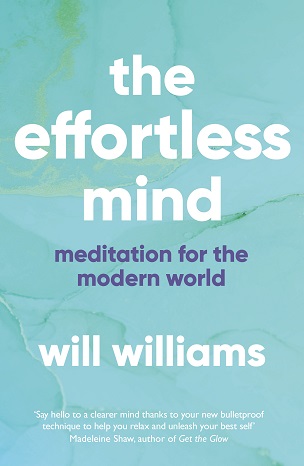By guest contributor Will Williams, teacher of Beeja Meditation
On a typical day, you might wake up and within seconds be on email or social media, or watching the news, then rush to work and spend a day facing endless tasks. Then there are social obligations, domestic chores, looking after others – it’s a lot to cope with, even for the most resilient of us and can lead to feelings irritability, tiredness, anxiety, worry and anger.
These are all normal human emotions and not ‘bad’ per se, but what is bad is being in them for too long so that they affect your life. When this happens, it can negatively affect your eating habits – hasn’t everyone grabbed a giant chocolate bar or cake mid-afternoon to get through the day? Or eaten carby foods to compensate for a loss of energy after a bad night’s sleep? This is where meditation comes to the rescue…
While there are many types of meditation, what they all have in common is that they’re designed to help you relax and switch on your parasympathetic nervous system, also known as the rest and digest response. This is so crucial in a society that is often running on adrenaline.
Meditation also helps improve so many other areas of your wellbeing, such as sleep, what you eat and how you exercise. The type of meditation I teach – the Beeja meditation, which involves chanting a mantra, has been shown to improve your slumber by lengthening deep sleep cycles as well as increasing total sleep time.
Here are some of the benefits of the Beeja mantra, including staying slim and stress-free:
- As it helps promote better sleep, the benefit is your body releases less of the hunger hormone ghrelin, which causes you to eat more, and more of the appetite suppressant hormone, leptin.
- A good night’s sleep also helps you feel well rested and less stressed, the benefit of which is you stop craving comfort foods in the first place. These foods only fuel the stress cycle, as they make your insulin levels rocket up and then down again, causing energy slumps.
- Feeling relaxed thanks to meditation helps you better process emotions, which in turn helps to ease comfort eating as you find a better outlet for your negative feelings and a way to process them, rather than stuffing them down with food.
- When you are more connected to your body and digestion, you intuitively eat better food and in healthier quantities. You also have significantly more energy, meaning you are more likely to want to exercise.
- Arguably the most profound effect of all is that meditation can help de-excite your nervous system. When this happens, the nervous system begins to purge itself of any pain and trauma it is carrying. As a result, you feel lighter, freer and more balanced.
- Meditation also helps you stay calm despite the digital overwhelm so many of us now face. Looking at screens all day has a seriously stimulating effect on your brain and wider nervous system, so having a daily practice that offsets this is crucial for short-term calm and long-term health and wellbeing.
In essence, instead of trying to fix all of your issues from the outside in (conscious to sub-conscious), deep meditative practices enable you to free up your sub-conscious and heal things from the inside out!
Try the Beeja mantra for yourself
Beeja meditation is incredibly effective at getting to the root of your stress response and calming down your body, so you are less reactive, more energised, and ultimately more productive. It uses sounds that interact with your nervous system and which are related to your seven main energy centres, or chakras, to help you deal with all of life’s dramas.
A common misconception is that you have to be in total silence. You can in fact meditate anywhere: on the bus or the tube, at the beach, in a park, in the cinema before a film starts, at your desk before a big meeting, on a plane if you are a nervous flier. Most people will just think you’re asleep!
It’s best to allow one to two hours after eating before you meditate so your body isn’t too busy digesting food and unable to slip into relaxation mode. It’s also best to avoid having caffeine before, as it’s very stimulating for your nervous system and can also delay your body’s relaxation response.
- Sit down, close your eyes, and plant your feet firmly on the floor. Feel both feet on the floor and let your awareness drift across all parts of your body. Now start gently repeating the sound ‘Beeja’ in your mind. Be soft and slow and faint and relaxed. Beeja means the ‘seed of infinite potential.’
- Do this for 5 minutes, coming back to whispering the sound in your mind every time you lose track of it, which will happen lots, and that’s ok! After 5 minutes, stop repeating the sound and take 30 seconds with eyes closed to think of someone, or something, you love. Hold that feeling in your heart, then go about your day feeling a little bit better.
- If you have more time and want to have a deeper experience, you can try the full beeja mantra. These sounds are tailored to your nervous system’s particular needs and will resonate with you in a more profound way so you can meditate really easily and get faster acting results. These are much more powerful so need to be taught in person by a qualified teacher.
 The Effortless Mind: Meditation for the Modern World, by Will Williams, is published in paperback today (May 2, 2019) by Simon & Schuster (available on Amazon ). For information about Will’s meditation classes visit beejameditation.com.
The Effortless Mind: Meditation for the Modern World, by Will Williams, is published in paperback today (May 2, 2019) by Simon & Schuster (available on Amazon ). For information about Will’s meditation classes visit beejameditation.com.








